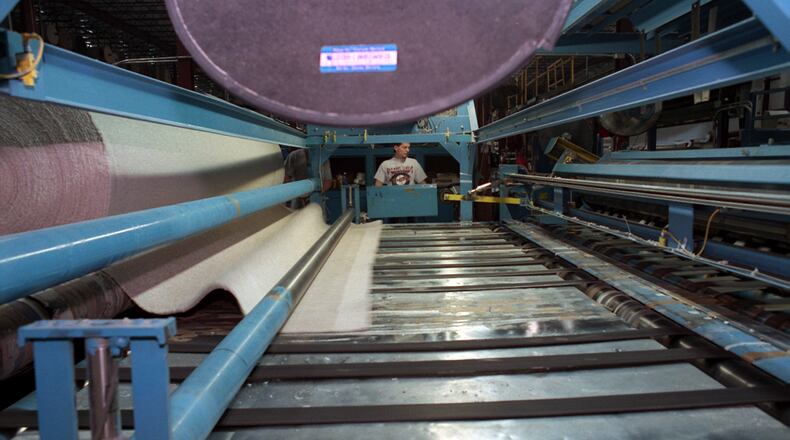Mohawk Industries, one of the nation’s premier flooring companies, has warned investors that its sales and profits are taking a beating because of the housing slump of recent months.
The Calhoun-based firm said in a statement earlier this week that it had cut back on production, temporarily shutting down some factories as it scrambled to adjust to a rapidly chilling market for housing and the materials that go into homes.
The company also said this week it has paid $60 million to settle a lawsuit that alleged a scheme to mislead investors by hiding financial troubles and defective products made at a north Georgia plant.
However, details were hard to come by.
James Brunk, the company’s chief financial officer, did not respond to a request for comment from the Atlanta Journal-Constitution. Messages to the company’s corporate offices were also not returned.
In a statement earlier this week, Mohawk warned investors that the results for its fourth quarter, which will be announced in February, will be much lower than expected.
Mohawk, long a mainstay of the economy in northern Georgia, has about 43,000 employees, about half of them in the United States and thousands of them in Georgia.
While the company has a range of flooring products, it has long depended for much of its sales on the housing industry — new homes especially. Mohawk was hit very hard by the burst of the housing bubble, the recession of 2007-09 and the years of very little construction activity that followed.
Mohawk struggled to rebound. Among the moves made to ramp up its offerings Mohawk bought a Belgian manufacturer that made luxury vinyl tile and had a plant in north Georgia.
For the year ending Sept. 30, Mohawk had about $11.8 billion in revenues, up solidly from the previous year. But the company’s net income was $181 million, down 83% from the year before.
The company now says it expects fourth-quarter earnings of between $1.27 and $1.31 per share, down from a previous projection of $1.40 and $1.50 per share.
That compares with Mohawk’s earnings of $2.95 per share during the fourth quarter a year ago.
The housing market’s woes began in the middle of last year as the Federal Reserve rapidly lifted its benchmark, short-term interest rate in an effort to bring down inflation. That campaign inevitably pushed up other rates, including mortgage rates, which are crucial to home sales.
Higher mortgage rates meant less purchasing power for homebuyers on one hand, while squeezing homebuilder profits on the other. The result was a sudden chill on construction and sales.
In recent days, the company also said it was settling a proposed class-action suit, brought by the Public Employees’ Retirement System of Mississippi that had alleged that its chief executive, Jeffrey Lorberbaum, and other company officials had falsely booked revenue.
The company boasted higher sales and profits, but, according to the lawsuit, the company was inflating results. The suit charged Mohawk with using a scheme to make deliveries on Saturdays when customers were closed and couldn’t decline product they didn’t need yet or that Mohawk knew was defective.
In a statement, the company said it believes that the suit is “without merit and that it has substantive defenses to the claims of liability and damages.”
However, Mohawk still agreed to pay $60 million to settle the action, the statement said. “Mohawk has concluded that further litigation would be protracted, burdensome and expensive.”
The company said “a significant portion” of that payment is covered by insurance.
Shares of Mohawk stock closed Friday at about $114 a share, down from $161.33 a year ago. Five years ago, Mohawk was selling at $270.58 a share.
______________________________
About the Author
Keep Reading
The Latest
Featured



